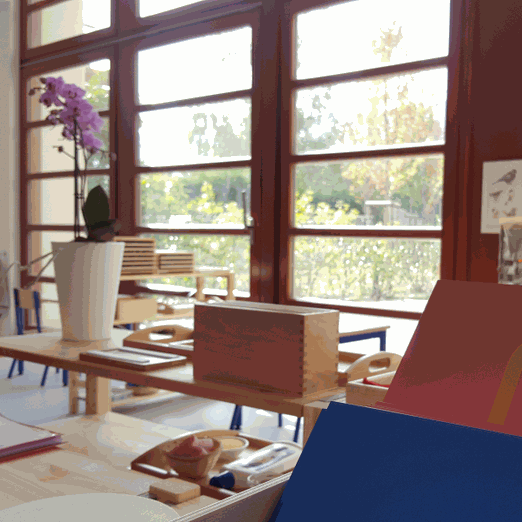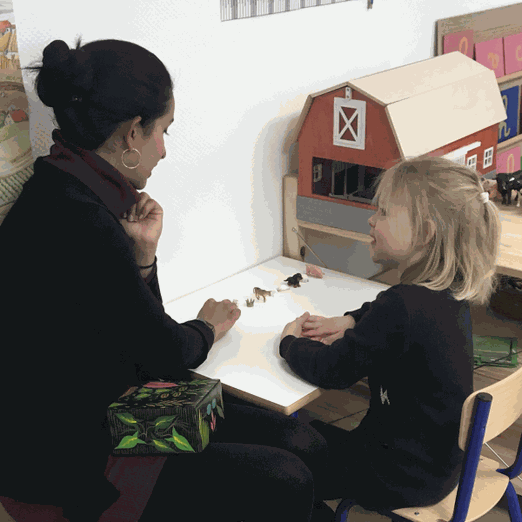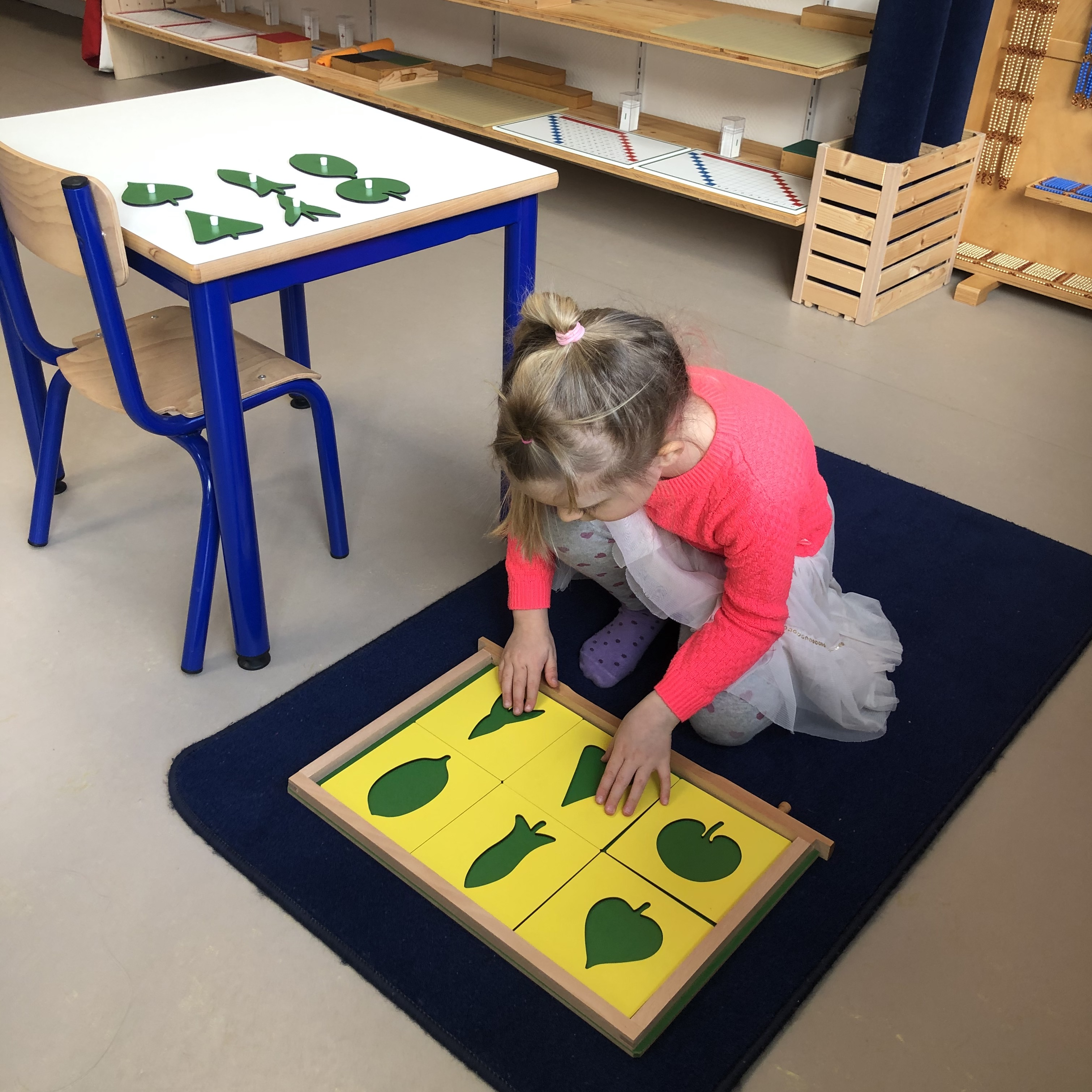
The Montessori pedagogy
Montessori represents a radically different approach to education, allowing children to develop "naturally".
First of all, the method appreciates the
intrinsic potential of each child, its ability to grow in an environment of
freedom and respect for its neighbor. The environment is calm, peaceful and
appropriate to the needs of the child. An important principle of Montessori
is the ability of young children to learn through sensory and tactile activities - they learn by doing.
The method also emphasizes learning through the 5 senses, not just sight (looking or reading) or hearing (listening to the teacher). Montessori offers adapted and specific sensory equipment. The same goes for language, mathematics, science or "practical life" materials.
In a Montessori classroom each child learns
at their own pace and chooses their own activities from the multitude of
exercises offered.
Learning becomes an engaging activity of discovery that
leads the child to concentration, motivation, self-discipline and the
desire to learn.

Maria Montessori
Maria Montessori (August 31, 1870, Chiaravalle near Ancona - May 6, 1952, Noordwijk aan Zee, Netherlands) was an Italian doctor and educator. She is internationally known for the educational method that bears her name, the Montessori pedagogy.
During these sensitive periods, the child assimilates a certain acquisition. If the child is helped at that precise moment, the learning takes place deeply. But if the child does not find the elements (in the environment and the material) that meet his need at the moment, the sensitivity will gradually wane.
Maria Montessori is convinced that the forces of development are included in the living being and that the work of education consists of preserving their spontaneity, and of removing anything that could weaken them and prevent them from flourishing.
It is necessary for the child to build his personality himself and to develop his motor and intellectual faculties. That is why the educator must have complete confidence in the child's forces, respect his freedom of action and prepare the necessary and favorable atmosphere for his development. The educator must be able to observe the differences in the child's rhythm, he must know each child well by showing attention and respect.

Atmosphere
The environment is an important factor in growth and well-being
The atmosphere of the Sunflowers is intended to be peaceful and serene, both cozy and lively. The child must be able to evolve freely in this space, in order to flourish, free to choose and act without inner or outer restraint. This freedom is however not a free-for-all or a free-for-all. Corollary to these are the notions of autonomy, responsibility, will, self-discipline and respect.

Educateur·trice
The educator accompanies the child, follows the emergence of their interests.
In summary, the teacher, for Maria Montessori, is not the one who teaches from on high but the one who accompanies the child, follows the emergence of their interests, and knows how to make the right material available to them.

Material
The Montessori pedagogy offers, for Cycle 1 (3 to 6 years old) more than 180 materials and 360 different exercises.
Children from 3 to 6 years old are gathered in one single group. This allows the biggest ones to help the smaller ones and to make those who are ready more responsible, and allows the smaller ones to learn through the others. The material in its entirety is available to all children, at an adapted height, in the classroom. The children can choose the material they want to use when they are ready to use it.
Nos valeurs
S'il fallait résumer nos valeurs en une seule nous choisirions le Respect. Une valeur qui synthétise toutes les autres et dont le terme même les rappelle et les contient, comme un acronyme récursif. R.E.S.P.E.C.T
Comme une chanson version Aretha Franklin (pour ceux qui en connaissent l'origine), comme l'association suisse du même nom (www.association-le-respect.org), comme la base de l'amour, comme le socle de beaucoup de choses.
Respect pour Respect
Respect de l'enfant et de son rythme; respect vers lequel Maria Montessori souhaite guider l'enfant. Respect de soi, respect des autres et de son environnement
rEspect pour Engagement
Car chacun d'entre nous est engagé. Dans ce qu'il fait, dans sa mission, pour l'enfant et son développement. Comment ne pas être engagé lorsque l'on croit en ce que l'on fait?
reSpect pour Simplicité
Simplicité de contact, simplicité de fonctionnement. Simplicité apparente de cette pédagogie de Maria Montessori, comme une évidence; mais ne nous méprenons pas, tout ce qui semble simple demande souvent beaucoup de préparation et de travail.
resPect pour professionnalisme
L'instruction, l'éducation, le développement de l'enfant, une pédagogie bien identifiée. Pour tout cela il est nécessaire de travailler avec des professionnels de qualité. Bien formés, soucieux des grandes règles et des détails, qui savent se remettre en question et cherchent constamment à progresser et se développer.
respEct pour Ecoute
Car pour agir à bon escient il faut prendre le temps d'entendre et de comprendre. Ecouter chaque enfant pour l'aider à sortir plus grand d'un conflit; écouter une famille pour réussir à lire correctement la réaction de leur enfant et y répondre de manière appropriée; écouter un équipier pour saisir ses nouveaux besoins et l'accompagner dans son évolution.
respeCt pour Communication
Car les échanges réguliers et fluides entre l'école et les parents sont la base d'une relation porteuse pour l'enfant, pour l'élève. La communication est un art difficile, mais la volonté et la persévérance aident fort heureusement.
respecT pour transparence
Pour que chacun dans les équipes se sente impliqué et sache dans quelle direction l'école avance. Pour que chaque parent puisse conforter sa confiance en l'établissement et l'équipe à laquelle il confie son enfant.